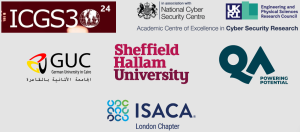The proceedings of the 16th ICGS3-24 will be published by Springer ‘Advanced Sciences and Technologies for Security Applications’ series.
Date: 25th, 26th & 27th November 2024
Location: Virtual Conference

Over the last two decades, technology relating to cyber space (satellite, drones, UAVs), cybersecurity, artificial intelligence and Generative AI has evolved rapidly. Today, criminals have identified rewards from online frauds therefore, the risks and threats of cyber attacks has increased too.
The aim of 16th ICGS3-24 is to understand the full impact of cybersecurity, AI, deepfake and Quantum computing on humanity. We are now at an age of technological advances such as Satellite communications, Drones and UAVs in conjunction with AI and GenAI that has never seen before. The ability to manage cybersecurity threats which requires identification, assessment and understanding of the threat together with clear accountability will be the foundation of the our debates and future strategies.
Detection of the threat is another strand to the strategy and will require dynamic risk management techniques, strong and up to date information governance standards and frameworks with AI responsive approaches in order to successfully monitor and co-ordinate efforts between the parties.
Thus, the ability to minimise the threats from cyber is an important requirement. This will be a mission critical aspect of the strategy with development of the right cybersecurity skills, knowledge and culture that are imperative for the implementation of the cyber strategies. Especially when this strategy is created within the artificial intelligence concept. As a result, the requirement for how AI Demand will influence business change and thus influence organisations and governments is becoming important.
In an era of unprecedented volatile, political and economic environment across the world, computer based systems face ever more increasing challenges, disputes and responsibilities and while the Internet has created a global platform for the exchange of ideas, goods and services, however, it has also created boundless opportunities for cyber-crime.
The ethical and legal implications of connecting the physical and digital worlds, and presenting the reality of a truly interconnected society, presents the realization of the concept of smart societies.
Drawing on 15 years of successful events, the 16th ICGS3-24 conference aims to provide attendees with an information-packed agenda with representatives from across the industry and the globe.
This Annual International Conference is an established platform in which security, safety, and sustainability issues can be examined from several global perspectives through dialogue between academics, students, government representatives, chief executives, security professionals, and research scientists from the United Kingdom and from around the globe.
The THREE days Virtual conference will focus on the challenges of complexity, the rapid pace of change, and risk/opportunity issues associated with the 21st-century lifestyle, systems, and infrastructures.
This conference will be organised by Northumbria University, UK, which is an Academic Center for Excellence in Cyber Security Research (ACE-CSR) recognised by the National Cyber Security Centre (NCSC) and Engineering and Physical Sciences Research Council (EPSRC), along with other partners.
| Important dates | |
|---|---|
| Abstract submission deadline (including poster deadline) | 29 May 2024 |
| Submission deadline (including poster) | 17 September 2024 |
| Peer review to be completed | 02 October 2024 |
| Camera ready/Authors Notification | 29 October 2024 |
| Author registration | 29 October 2024 |
| The Virtual ICGS3 Conference takes place | 25 – 27 November 2024 |
The list of topics includes (but are not limited to):
Special Session 1
Session Chair:
Professor Amin Hosseinian-Far, University of Hertfordshire, UK
Dr Sara El-Deeb, German University in Cairo, Egypt
Dr Nitsa Herzog, Northumbria University London, UK
Dr Abdulrahman Salih, Northumbria University London, UK
The dark side of Gen AI: ethical and legislative challenges, potential risks and governance
This special session is a platform to debate and provide a better understanding of the full impact of cybersecurity, AI, deepfake and Quantum computing on humanity. We are now at an age of technological advances of AI and GenAI that has never seen before. The ability to manage cybersecurity threats which requires identification, assessment and understanding of the threat together with clear accountability will be the foundation of the our debates and future strategies.
The requirement for how AI will influence business change and thus influence organisations and governments is becoming important.
The aim of this special session is to examine and cover some of the topics below (but are not limited to):
Special Sessions 2:
Session Chair:
Dr Sina Pournouri, Sheffield Hallam University, UK
Dr Reza Montasari, University of Swansea, UK
Dr Nasr Abosata, Northumbria University London, UK
Satellite, Drones and UAVs Cybersecurity threats and countermeasures
Space exploration and satellite technology plus Drone and UAVs have travelled a long way in recent years and some may debate that we are in the midst of a revolution, in terms of development and the increasing number of satellites and unmanned Aerial systems. Future 5G and 6G networks can be constructed and operated using satellites and space technology. As satellites sit in a global sphere that belong to no nation, it makes space governance a complicated dynamic with many entities contributing to their own requirements and not necessarily taking into account all aspects or other factors. It opens up many questions regarding control, data, privacy, security, and so on.
The aim of this special session is to examine and cover some of the topics below (but are not limited to):
Undergraduate and Postgraduate Poster session
Session Chair:
Stefan Kendzierskyj, Cyfortis, UK – stefan@cyfortis.co.uk
Co-Chair:
Dr Abdulrahman Salih, abdul.salih@northumbria.ac.uk
16th ICGS3-24 will host a virtual poster session, to provide an opportunity for postgraduate and final year Undergraduate students to share ideas, ongoing research, and accomplishments from around the globe in the context of Cybersecurity and Human Capabilities through Symbiotic Artificial Intelligence.
Presenting a poster is a good way to engage in an in-depth discussion about the presented work from which new ideas and solutions can emerge and initiate conversation with conference attendees interested in the same area.
Format and time:
Please use the poster template here.
16th ICGS3-24 poster session will be held virtually, meaning that all posters will be presented at an online exhibition area on the ICGS3-24 area on the afternoon of 25th November 2024. Details will be provided nearer the time.
The posters WILL NOT be included on the proceedings of the conference, but, once collated in a form of poster electronic magazine it will be shared with the students.
Topics of the poster presentations will be the same as the above suggested topics.
Poster registration:
All accepted posters are part of 16th ICGS3-24. Participation at 16th ICGS3-24 is subject to registration fees. It will cost £50 for students participation with only 1 POSTER submissions (plus attendance of the conference sessions only).
| Poster submission dates | |
|---|---|
| Poster abstract submission | 27 June 2024 (optional) |
| Poster submission | 17 September 2024 |
| Poster peer review to be completed | 02 October 2024 |
| Poster notification | 29 October 2024 |
| Poster registration | 29 October 2024 |
General Chair:
Professor Hamid Jahankhani
hamid.jahankhani@northumbria.ac.uk
Co-chair:
Dr Biju Issac (Director, ACE-CSR)
Bill Reid, Google, USA
Dr Amna Qureshi, Bradford University, UK
Dr MD ISRAFIL BISWAS, University of Bedfordshire, UK
Dr Ghazanfar Ali Safdar, University of Bedfordshire, UK
Dr Naercio Magaia, University of Sussex, UK
Dr Muhammad Shadi Hajar, Robert Gordon University, Aberdeen, UK
Dr Mazhar Malik, University of the West of England, UK
Dr Pooneh Bagheri Zadeh, Leeds Beckett University, UK
Dr Charles Morisset, Newcastle University, UK
Dr Ali Safaa Sadiq Al Shakarchi, Nottingham Trent University, UK
Dr Eckhard Pfluegel, Kingston University, London, UK
Dr Zhibao Mian, University of Hull, UK
Dr Shitharth Selvarajan, Leeds Beckett University, UK
Osama Akram Amin Metwally, Northumbria University, UK
Dr Muhammad Muzammal, Northumbria University, UK
Dr Jordan Schoenherr, Carleton University, Canada
Dr Mo Adda, Portsmouth University, UK
Dr Uchenna Ani, University of Keele, UK
Dr Nigel Houlden, Manchester Metropolitan University, UK
Dr. Abdur Rakib, Coventry University, UK
Full research papers limited 7000-8000 words report on novel and completed work of important value to the community. The work should not be published or in submission anywhere else.
All accepted papers would be included in the proceedings of the 16th ICGS3 will be published by Springer ‘Advanced Sciences and Technologies for Security Applications’ series.
There is an expectation and trust that all submissions are of high quality with substantial novel research achievements. All papers have to be written in English language. All submissions will be peer reviewed for publication.
Manuscripts must adhere to the Springer, conference paper templates. All Authors must complete and submit the correct copyright form which will be provided after the peer review completion.
All articles for 16th ICGS3-24 must be submitted using the online submissions system.
You need to register to use the online submission system.
On submission, please remove all identifying information from your submission, including author names, affiliations, and any acknowledgments.
All authors must register by 4 September 2023, for papers to be included in the Conference
| Category | Fee |
| Author Registration (one paper only) and general virtual participation | £210 |
| PhD Student Registration (All PhD student registrations must be accompanied by a letter from their university confirming current PhD student status) | £170 |
| Student & Supervisor Joint Registration (one paper only) | £290 |
| Each additional paper per registered author | £50 |
| Late Registration (non-authors), Full Registration (after 29th October 2024) | £310 |
| Students Participation with only 1 POSTER submissions (plus Attendance of the conference sessions only) | £50 |
Authors and General Participation rates include: attendance to all sessions, soft copy of the Proceedings.
PhD Student rates apply to full-time or Part-time students who provide a declaration from the University stating their status. This information should be emailed to the organisers with the registration form, otherwise it won’t be considered.
NOTE: Some more updates are expected to this website, based on more specific information we gather.

“I chose Northumbria because the AACSB double accreditation for the Business School was attractive to me. The ability to develop my language skills was another element which I liked, I wanted to improve my English and work with a diverse group of people. I most enjoy being in an environment which is so diverse as it gives you more vocational skills. Participating in group work has encouraged me to adapt my learning style and ability to work with a wider range of people. The teachers here are very open and encourage us to keep in touch with them regarding our work.”